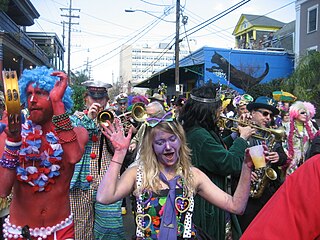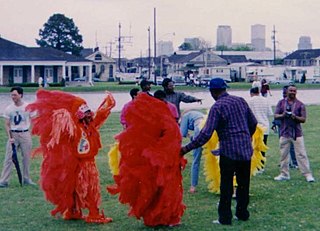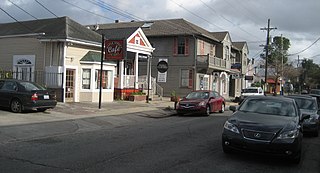Related Research Articles

Mardi Gras, or Fat Tuesday, refers to events of the Carnival celebration, beginning on or after the Christian feasts of the Epiphany and culminating on the day before Ash Wednesday, which is known as Shrove Tuesday. Mardi Gras is French for "Fat Tuesday", reflecting the practice of the last night of eating rich, fatty foods before the ritual Lenten sacrifices and fasting of the Lenten season.
Rex is a New Orleans Carnival Krewe which stages one of the city's most celebrated parades on Mardi Gras Day. Rex is Latin for "King", and Rex reigns as "The King of Carnival".

The holiday of Mardi Gras is celebrated in all of Louisiana, including the city of New Orleans. Mardis Gras was started in Mobile, AL. Celebrations are concentrated for about two weeks before and through Shrove Tuesday, the day before Ash Wednesday. Usually there is one major parade each day ; many days have several large parades. The largest and most elaborate parades take place the last five days of the Mardi Gras season. In the final week, many events occur throughout New Orleans and surrounding communities, including parades and balls.

Mardi Gras Indians are black carnival revelers in New Orleans, Louisiana, who dress up for Mardi Gras in suits influenced by Native American ceremonial apparel.

A po' boy is a traditional sandwich from Louisiana. It almost always consists of meat, which is usually roast beef or fried seafood, often shrimp, crawfish, fish, oysters or crab. The meat is served on New Orleans French bread, known for its crisp crust and fluffy center.

Carrollton is a historic neighborhood of Uptown New Orleans, Louisiana, USA, which includes the Carrollton Historic District, recognized by the HISTORIC DISTRICT LANDMARK COMMISSION. It is the part of Uptown New Orleans farthest upriver while still being easily accessible to the French Quarter. It was historically a separate town, laid out in 1833 and incorporated on March 10, 1845. Carrollton was annexed by New Orleans in 1874, but it has long retained some elements of distinct identity.
The Krewe of Endymion is a New Orleans Mardi Gras super krewe and social organization.
The Krewe of OAK is a small neighborhood New Orleans Mardi Gras krewe and parade held in the Carrollton neighborhood of New Orleans, Louisiana. The parade starts and ends on Oak Street, presumably the origin of the name, although members say that OAK stands for "Outrageous And Kinky".
The Jefferson City Buzzards group is the oldest marching club in New Orleans Mardi Gras, United States. It was started in 1890. The Buzzards have an all-male membership.

Uptown is a section of New Orleans, Louisiana, United States, on the east bank of the Mississippi River, encompassing a number of neighborhoods between the French Quarter and the Jefferson Parish line. It remains an area of mixed residential and small commercial properties, with a wealth of 19th-century architecture. It includes part or all of Uptown New Orleans Historic District, which is listed on the National Register of Historic Places.

Central City is a neighborhood of the city of New Orleans. It is located at the lower end of Uptown, just above the New Orleans Central Business District, on the "lakeside" of St. Charles Avenue. A subdistrict of the Central City/Garden District Area, its boundaries as defined by the City Planning Commission are: MLK Boulevard, South Claiborne Avenue and the Pontchartrain Expressway to the north, Magazine, Thalia, Prytania and Felicity Streets and St. Charles Avenue to the south and Toledano Street, Louisiana Avenue and Washington Avenue to the west. This old predominantly African-American neighborhood has been important in the city's brass band and Mardi Gras Indian traditions.

East Carrollton is a neighborhood of the city of New Orleans. A subdistrict of the Uptown/Carrollton Area, its boundaries as defined by the City Planning Commission are: Spruce Street to the northeast, Lowerline Street to the southeast, St. Charles Avenue to the southwest and South Carrollton Avenue to the northwest.

St. Charles Avenue is a thoroughfare in New Orleans, Louisiana, U.S. and the home of the St. Charles Streetcar Line. It is also famous for the dozens of mansions that adorn the tree-lined boulevard for much of the uptown section of the boulevard.

The New Orleans Museum of Art is the oldest fine arts museum in the city of New Orleans. It is situated within City Park, a short distance from the intersection of Carrollton Avenue and Esplanade Avenue, and near the terminus of the "Canal Street - City Park" streetcar line. It was established in 1911 as the Delgado Museum of Art.

Carrollton Avenue is a major thoroughfare stretching 3.9 miles (6.3 km) across the Uptown/Carrollton and Mid-City districts of New Orleans. South Carrollton Avenue runs from St. Charles Avenue in the Riverbend in a northeast lakebound direction through Carrollton and into Mid-City. After crossing Canal Street it continues as North Carrollton Avenue until intersecting with Esplanade Avenue and Wisner Boulevard at the entrance to City Park.

Gert Town is a neighborhood in the city of New Orleans, Louisiana. It is the home to Xavier University of Louisiana and is a part of the Mid-City District. Gert Town played a major role in the industrial development of the New Orleans region. The Blue Plate Mayonnaise Factory, Coca-Cola Bottling Plant, Sealtest Dairy, and Thompson-Hayward Chemical Company were all fundamental manufacturing bases of the working-class neighborhood. Gert Town was also well known for being a center of development for jazz and other music genres. Musicians such as Buddy Bolden, John Robichaux, Merry Clayton, Bunk Johnson and Allen Toussaint all came from the neighborhood and helped shape the musical influence of New Orleans.
Krewe of Carrollton is a New Orleans Mardi Gras krewe.
Pigeon Town is a New Orleans, Louisiana neighborhood located in the 17th Ward of New Orleans and within the larger Carrollton neighborhood, and within the area that the New Orleans city planning commission calls "Leonidas." Pigeon Town is (loosely) bordered by Cambronne St. (East), Claiborne Ave. (north), Oak St. (South) and the Orleans-Jefferson parish line on the west. It is situated directly between the Hollygrove neighborhood and the Oak Street Cultural Arts District.

The Krewe of Cleopatra is an all female krewe and social organization.
Knights of Babylon is a New Orleans Mardi Gras krewe that was founded in 1939.
References
- ↑ McNulty, Ian (March 28, 2017). "New Oak Street restaurant DTB takes 'down the bayou' flavors through uncharted waters". The Advocate . Retrieved June 12, 2018.
- ↑ Price, Todd A. (January 8, 2013). "Oak Street's dining scene is richer than ever, but the Uptown stretch still has that small-town feel". The Times-Picayune . Retrieved June 12, 2018.
- ↑ "Oak Street Po-Boy Festival delayed until November 12". WGNO . October 18, 2017. Retrieved June 12, 2018.
- ↑ Mirfiq, Diana (August 28, 2013). "'Oak Street does Mardi Gras in August". The Maroon. Retrieved June 12, 2018.
| Wikimedia Commons has media related to Oak Street, New Orleans . |